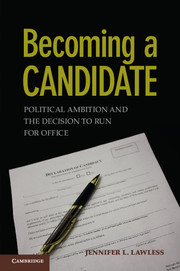Book contents
- Frontmatter
- Contents
- List of Tables
- List of Figures
- Acknowledgments
- 1 Mudslinging, Money-Grubbing, and Mayhem
- 2 The Decision to Run for Office
- 3 Political Ambition in the Candidate Eligibility Pool
- 4 Barack Obama and 18 Million Cracks in the Glass Ceiling
- 5 You Could Be President Someday!
- 6 On-the-Job Training
- 7 You Think I Should Run for Office?
- 8 Biting the Bullet
- 9 Future Patterns of Candidate Emergence and Studies of Political Ambition
- Appendix A The Citizen Political Ambition Panel Study
- Appendix B The First Wave Survey (2001)
- Appendix C The Second Wave Survey (2008)
- Appendix D The First Wave Interview Questionnaire
- Appendix E The Second Wave Interview Questionnaire
- Appendix F Coding of Variables
- Works Cited
- Index
- References
4 - Barack Obama and 18 Million Cracks in the Glass Ceiling
Sex, Race, and Political Ambition
Published online by Cambridge University Press: 05 June 2012
- Frontmatter
- Contents
- List of Tables
- List of Figures
- Acknowledgments
- 1 Mudslinging, Money-Grubbing, and Mayhem
- 2 The Decision to Run for Office
- 3 Political Ambition in the Candidate Eligibility Pool
- 4 Barack Obama and 18 Million Cracks in the Glass Ceiling
- 5 You Could Be President Someday!
- 6 On-the-Job Training
- 7 You Think I Should Run for Office?
- 8 Biting the Bullet
- 9 Future Patterns of Candidate Emergence and Studies of Political Ambition
- Appendix A The Citizen Political Ambition Panel Study
- Appendix B The First Wave Survey (2001)
- Appendix C The Second Wave Survey (2008)
- Appendix D The First Wave Interview Questionnaire
- Appendix E The Second Wave Interview Questionnaire
- Appendix F Coding of Variables
- Works Cited
- Index
- References
Summary
On June 7, 2008, Hillary Clinton took to the podium for what would be her last speech as a presidential candidate. After thanking her supporters, volunteers, staff, and friends, she spoke very openly about what her candidacy meant for women's political progress: “You can be so proud that, from now on, it will be unremarkable for a woman to win primary state victories, unremarkable to have a woman in a close race to be our nominee, unremarkable to think that a woman can be the President of the United States. And that is truly remarkable.” Then, in what became perhaps the most famous lines of her campaign, then-Senator Clinton commented on the prospects of electing a woman president:
If we can blast 50 women into space, we will someday launch a woman into the White House. Although we weren't able to shatter that highest, hardest glass ceiling this time, thanks to you, it's got about 18 million cracks in it. And the light is shining through like never before, filling us all with the hope and the sure knowledge that the path will be a little easier next time.…And all of you will know that because of your passion and hard work you helped pave the way for that day.
Nearly three months later, during her first speech as the Republican Party's vice presidential candidate, Sarah Palin uttered very similar words. She reminded her supporters at a Dayton, Ohio, rally that “Hillary left 18 million cracks in the highest, hardest glass ceiling in America. But it turns out that the women of America aren't finished yet, and we can shatter that glass ceiling once and for all.”
Clinton's and Palin's candidacies made the 2008 presidential campaign historic, but the election of Barack Obama as the first black president of the United States was nothing short of monumental. On election night, in front of an audience of 125,000 people assembled in Grant Park in Chicago, then-President-Elect Obama reflected on the symbolism of his victory: “If there is anyone out there who still doubts that America is a place where all things are possible; who still wonders if the dream of our founders is alive in our time; who still questions the power of our democracy, tonight is your answer.” Sending a strong message about the importance of engaging the political system, regardless of race, class, sex, age, or ideology, Obama told the crowd about Ann Nixon Cooper, an elderly supporter from Atlanta:
She was born just a generation past slavery…when someone like her couldn't vote for two reasons – because she was a woman and because of the color of her skin.…And this year, in this election, she touched her finger to a screen and cast her vote, because after 106 years in America, through the best of times and the darkest of hours, she knows how America can change.
- Type
- Chapter
- Information
- Becoming a CandidatePolitical Ambition and the Decision to Run for Office, pp. 49 - 76Publisher: Cambridge University PressPrint publication year: 2011



